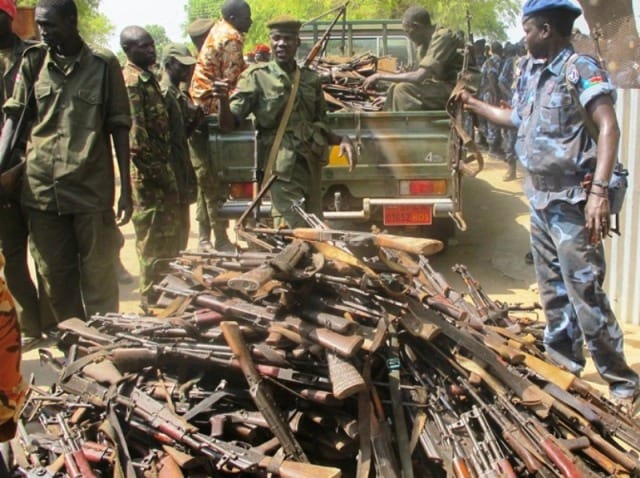Authorities in South Sudan’s Warrap State have announced that over 4,000 illegal firearms have been voluntarily surrendered by civilians in Tonj East County, marking a significant step forward in the government’s disarmament campaign aimed at curbing local violence and cattle-related conflict.
The disarmament initiative follows President Salva Kiir’s recent declaration of a state of emergency in Warrap State and Unity State’s Mayom County, where decades of communal violence and revenge killings have devastated local populations. The government issued a seven-day ultimatum for voluntary compliance before sending in a joint force from the country’s armed services to carry out enforced disarmament.
Tonj East County Commissioner Mangor Dhuol told Wall Africa Journal that local communities have embraced the process, handing over thousands of guns to traditional chiefs, who are then transferring the weapons to the South Sudan People’s Defence Forces (SSPDF).
“As of 11 a.m. Monday, more than 4,000 firearms had been collected from all payams of Tonj East. The people themselves are delivering these weapons to their chiefs,” Dhuol confirmed.
Support—and Fear—Among Civilians
Local leaders in other parts of Warrap also reported cooperation. Ayii Kuot, the deputy paramount chief of the Noi Community in Tonj North, said civilians had begun turning in weapons last week. “We are still collecting more each day. I personally received 15 guns from residents in our area,” he said.
However, the disarmament drive is not without serious concerns. Tonj North County Commissioner Mawein Akech reported a deadly attack on Sunday by armed youth from Mayom County in Unity State. Several civilians were killed, and cattle were looted.
“My people had no means to defend themselves. They obeyed the disarmament order, but others did not. Now we are exposed,” Akech said, warning of the security vacuum the process may leave behind.
Slow Rollout in Some Areas
Meanwhile, in Gogrial East County, no weapons have yet been collected due to delays in troop deployments. Commissioner Marko Garang Agany said civilians are prepared to cooperate but are still awaiting the arrival of SSPDF forces.
“People here understand the government’s call and are willing to hand over their weapons, but the organized forces have not yet reached our county,” he explained.
Civil society voices also weighed in. Bona Malual, a local activist, welcomed the campaign but called for sustained government protection. “Disarming civilians is a step toward peace, but the government must now ensure their safety from armed raiders, especially from Lakes and Unity states,” he cautioned.
Looking Ahead
While the initial response in Tonj East appears promising, the events in Tonj North reveal the fragile nature of the process. If not matched with rapid deployment of security forces and coordination across state borders, disarmament risks leaving some communities defenseless.
Efforts to reach SSPDF spokesperson Maj. Gen. Lual Ruai for an update on the broader operation were unsuccessful at the time of publication.
As the disarmament campaign unfolds, the South Sudanese government faces the dual challenge of collecting weapons and ensuring that civilians are not left vulnerable in the aftermath—especially in regions where inter-communal trust remains fragile.



